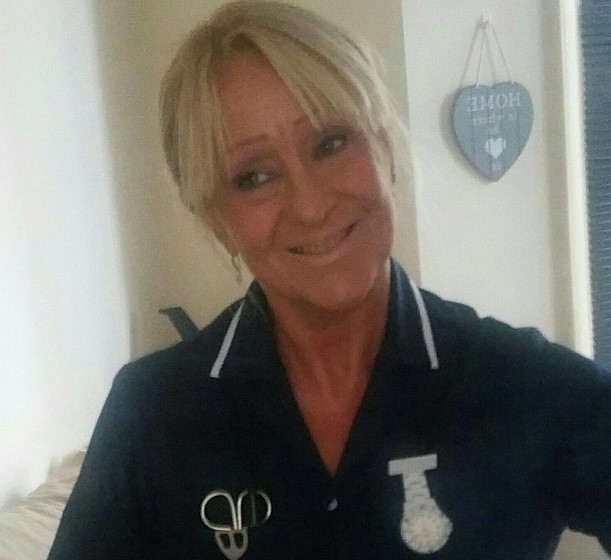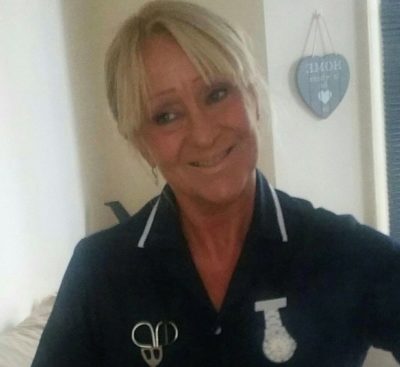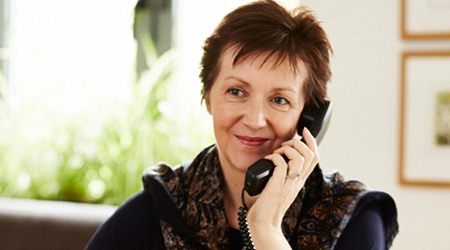

April & Sharon
April shares the story of her mum, Sharon, who passed away from pancreatic cancer aged 60, after a few short weeks in hospital. She tells us of their shock at losing Sharon so quickly.
We didn’t realise there was anything seriously wrong with our mum in the months before she died.
She was feeling a bit tired and down, but she was 60 years old and working 12 hour shifts in a care home. She also had early onset Type 2 diabetes, which was diagnosed four years ago. So we didn’t think anything of it.
She had just got her perfect job in a new home, where she was so happy. But after just one month there, it all happened.
Some early symptoms – but we didn’t know
Looking back, there were a couple of things wrong, but nothing gave us any alarm. She didn’t say anything about being in pain – but perhaps she just didn’t tell us.
Mum lost weight over about a year or so. She became very skinny. But she was a very healthy eater, and we put it down to the special diet she was on for her diabetes. She had been a healthy weight all her life until then.
Her hair was also falling out more and it was very dry and breaking. I used to do her hair for her sometimes, so I noticed. She had always had lovely hair.
Then she started to feel weak. The doctors only started checking her weight because of the weakness. If she had been checked sooner, perhaps it would have been spotted earlier. As it was, she was very ill by the time she was diagnosed.
I think COVID slowed things down in terms of getting help with mum’s illness. Consultations with the GPs were always on video or on the phone. I think they would have spotted the weight loss earlier if they could have seen her in real life.
Mum’s health began to fail
Mum started to become very weak a couple of months before she was admitted to hospital. It was really worrying – she couldn’t stand up by herself, at points. I was often telling her to go to hospital.
Then one day she collapsed and passed out. She was hallucinating; it was scary. Luckily, I was with her: it was only then, as I tried to support her, that I saw properly how thin she was. She was skin and bone.
I called the ambulance and she was taken straight to intensive care. She had Diabetic ketoacidosis (DKA), which is a serious problem caused by diabetes.
Getting a diagnosis of advanced pancreatic cancer
After a spell in intensive care, she regained consciousness and could do some things for herself. But she couldn’t really walk anymore. She even had to have help to do things like taking her insulin.
She had been in hospital for about a month when we found out she had cancer. She had a biopsy done, but had to wait three weeks for the results. Then she had a CT scan – it showed pancreatic cancer, and secondary liver cancer. The nurses told me, “She’s got days, if not hours.”
I don’t know how much of it mum was able to take in. It was all very quick, and she couldn’t talk much towards the end. When I saw her on the day we found out, she wasn’t with it. I asked the nurse how mum took the news that she was dying, as my sister and I weren’t with her when they broke the news. The nurse said, “She’s only worried about you girls.”
Three days later, mum had a stroke and was moved to the stroke ward. She lost all feeling in her left hand side. They told us the cancer had caused the stroke, and it weakened her even more.
Caring for mum at the end of life
Mum wasn’t able to be treated for her cancer. It was too far along. Straight away, she was given palliative care. She had pain relief, but on the stroke ward. It was the wrong place for her really. It would have been good if she had been able to go into a hospice, but she was too ill to be moved.
My sister, Kim, and I visited mum almost every day. We both stayed as long as we could, taking turns to sit with her. But I think mum had had enough by the end – it was all too much for her. I think she was waiting until we left. She wouldn’t have wanted us to be in the room and see her die.
She was mostly not responsive by that point, but I think she was aware that we were there. We told her everything we were doing to put things in order so that she could feel at peace.
The day she died, I had to go home to look after my kids, but I knew she was near the end. As I told her I was grateful to have had her as my mum, I could see the edge of her eyes become wet with tears. I gave her a kiss and said goodbye.
Kim was the last to leave, with her husband. As my sister left, she kissed her and said “I love you.” Mum made a noise then, the first sound we had heard her make for some time. I know she was listening.
Mum passed away on the 10th of November 2021.
It was all so quick. She was in hospital just six weeks prior to her passing. I had to clear out her rented flat the day after she passed away. I don’t know how I did that.
It’s hard to get your head around the rapidity of it, when something like this happens to someone you love. You think they will come out of hospital and go back to normal. But our mum left home in the ambulance and never came back.
Honouring our mum’s memory
Like mum, I’m a carer. I also bake personalised biscuits in my spare time. I plan to do a charity bake sale with my sister, to raise funds and awareness of pancreatic cancer. We’ll hire a hall and get as many people in as we can. I find baking very therapeutic and creative. Mum liked to bake too – she was an amazing cook.
Mum was very happy with her life. She always said she didn’t have much, and didn’t need much. She enjoyed the simple things in life and was very independent. She loved her children and grandkids, and her job in care.
Our mum was kind, caring, and very, very loving. That’s how we’ll remember her.
March 2022


